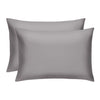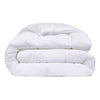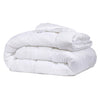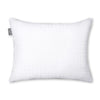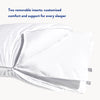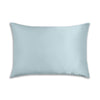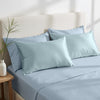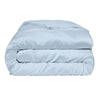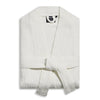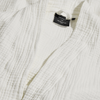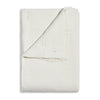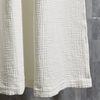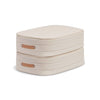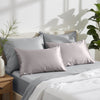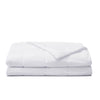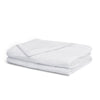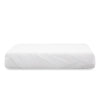The Daily Miracle
Comforter vs. Blanket: What's the Difference?
Published
June 03, 2022
Author
Nicholas Crusie

Considering you spend around 26 years sleeping, having reliable and loved bedding should be a top priority. Bedding technology has come a long way in recent years —- it's not just silk vs. satin anyone. As we're sure you know, there are tons of factors you should consider when choosing your bedding.
Today's question at hand is an important one. So, are you a comforter or blanket kind of person? Don't know yet?
Let’s discuss:
It Comes Down to Individual Preference
Comforters and blankets both have pros and cons, but it really depends on what works best for you. We're going to break down each of these products and their primary functions, so you can decide which one best fits your bedding needs.
Comforters Explained
It's not uncommon for duvets, comforters, and blankets to get mixed up, but they're all different (in small ways). A comforter is a piece of bedding made from two pieces of fabric. Those two pieces of fabric are sewed together and stuffed with various stuffing materials.
The stuffing material can vary. Less-pricey comforters are stuffed with synthetic fibers like cotton, polyester, wool, and silk, while more expensive comforters are filled with natural down like goose or duck feathers.
Comforters are usually more fluffy than a blanket and may offer more warmth. Expect comforters to be filled with fillers sewn into place, keeping the stuffing material distributed evenly. This bedding type is considered much less work than a duvet as they're easy to clean and require no assembly.
Comforters they're notorious for being warm. If you live in a colder climate and love to cuddle up, a comforter is a smart choice. However, you may want to go with a more lightweight option if your living conditions don't favor heavy bedding.
Your body has a natural clock called the cardiac rhythm. Your cardiac rhythm controls your natural sleep cycle and body temperature while you sleep.
It's widespread for people to feel warmer while they sleep, but your body actually drops one to two degrees during sleep. If your night sweats are driving you crazy, your comforter may be to blame!
Why You Might Want a Comforter
No assembly needed
Unlike a duvet, blankets don't require assembly, but they may not offer the right amount of warmth or coverage.
More variety
Considering comforters are very common, you can expect a wider variety in stores and online.
Color coordinating sets
Blankets are usually only sold separately, but comforters are often offered in color-coordinating sets. You can match your comforter to the rest of your bedding collection or even room details like an accent wall.
Very warm
Comforters are warmer than an average blanket, so you should definitely consider a comforter if you're looking for a bed set to keep you cozy in the cooler months.
Made with love (and science)
While we may be biased, we consider the fact that Miracle Made carries comforters a pro.
Miracle Made has all antibacterial and hypoallergenic products. Our 500-thread count Supima cotton silver-infused comforter is a bedroom must (in our eyes, at least). Not to mention, it's temperature-regulating, meaning you can say bye-bye to morning sweat puddles.
What Are the Drawbacks to Comforters?
May flatten
Overtime comforters are known for going flat. If you purchase a high-quality comforter, you can expect it to last a few years, but as the synthetic filling depletes, it’ll leave your comforter looking a bit limp.
Might be tough to clean
Since comforters consist of two layers, you can expect them to be heavier than a traditional blanket. This heavy material may make it more challenging to clean and transfer from washer to dryer.
More expensive
It's fair to assume comforters will be more pricey than blankets. Of course, we believe bedding is worth splurging on, but we understand if you'd like to stick to your budget.
Blankets Explained
The main difference between a comforter and a blanket is that blankets don't have any filling. Comforters consist of two layers stuffed and sewed together — blankets are just a singular piece of fabric.
We all know that waking up hot and sweaty isn't a good feeling. People who tend to get too hot when they sleep or move around a lot might put a nice blanket at the top of their wishlist.
While blankets may not be as fluffy as comforters, that's not to say they can't be just as cozy — blankets work great for layering. This can be incredibly convenient if you struggle with heat flashes as you can shed and add layers throughout the night.
Blankets are nice because they're lightweight, making wash-day a breeze.
Why You Might Want a Blanket
Lightweight
Blankets are lightweight, so you don't have to worry about potentially feeling weighed down.
Easy clean-up
Most blankets don’t come with specific washing instructions and can be tossed in the wash on the gentle cycle. Some blankets might require a little more care. For example, faux fur blankets will likely need to be hand washed.
Great for layering
Blankets come in a variety of unique colors and patterns. You can throw them over a couch or chair to bring a fun pop of color to any space. You can also layer a blanket on top of your duvet or comforter for those extra chilly winter nights.
What Are the Drawbacks to Blankets?
Limited warmth
Less fabric may be a pro if you're a hot sleeper, but a blanket may not get the job done if you tend to get cold at night.
Not as fluffy
What makes a comforter so comfortable and cozy is its extra layer of fabric and fluff. Since blankets are only one piece of fabric, they are very flat and shapeless. If you are looking for textured blankets, sherpa blankets might be your best bet.
Standard Comforters vs. Miracle Made
If you've decided that a comforter would best fit your bedding needs, here are a few factors to consider.
Comforters are a lot like people; they each have unique qualities that set them apart. We believe that all comforters should be hypoallergenic, antibacterial, and crafted from the finest Supima cotton (just like the Miracle Comforter).
Here’s why material matters:
Hypoallergenic
Our silver-infused products are hypoallergenic and antibacterial, meaning if you use these products, you may see a change in your pesky allergies. Allergies to synthetic fabrics are common, but even natural materials, like goose down, can bring on a case of the sniffles or a pesky skin rash.
Antibacterial
We talk a lot about antibacterial products, but what does that even mean?
Antibacterial products are silver-infused — silver is a natural antimicrobial. Silver-infused products prevent 99.9 percent of bacteria growth. This means that while you doze, your bedding is fighting off bacteria, creating a peaceful, healthy sleeping space (and far less laundry for you to do).
Supima Cotton
Our comforters are made with ultra-luxurious 500-thread count Supima cotton. Supima cotton is high-quality American-grown cotton that offers the best feeling possible for your skin — without the ethical implications of using a fabric like satin.
Our Favorite Creature Comforts: Comforters
Sleep is our safe space. It helps us refuel, recharge, and relax. Your bedroom is your personal haven, so whether you choose blankets, duvets, comforters, or just love a simple pair of sheets, Miracle Made is here to help you rest easy.


